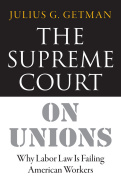by Paul Garver

If you are as tired as I am of inane electoral political commentary in the media, why not take some time over the Labor Day weekend to consider the deep roots of the growing economic and political inequality that underlies the superficial campaign rhetoric?
I would not normally recommend sources on labor law and labor economics for your holiday reading. But here goes.
The Economic Policy Institute [EPI] just released a new research report, “Union decline lowers wages of nonunion workers: The overlooked reason why wages are stuck and inequality is growing,” Access at http://www.epi.org/files/pdf/112811.pdf
The EPI Report analyzes how the decline of organized labor in the USA has contributed to wage stagnation and economic inequality. If good jobs in industry are increasingly scarce and pay for private sector workers has barely budged in the last four decades, a major cause is the catastrophic decline in private sector unionism from 35% to 5%. Building walls along the borders and expelling undocumented immigrants will not help alienated working-class voters. As Hamilton Nolan advises them in his analysis of the EPI Report: “Don’t get mad at foreigners. Unionize. It’s the only battle in the class war that lies entirely within your power to win.”
However a major contributing factor to the decline of union organization is the way the U.S. Supreme Court has interpreted labor law over the same decades. Labor law professor and practitioner Julius Getman has written a concise and spritely study called The Supreme Court on Unions: Why Labor Law Is Failing American Workers (Cornell Univ. Press, 2016). In fewer than 200 pages, Getman demonstrates how a series of Supreme Court decisions on union organizing, collective bargaining, the right to strike, picketing, boycotts, the duty of fair representation, and the definition of “employee” have effectively gutted the ability of labor unions to organize new members and to bargain good contracts.
When over forty years ago I was hired by a local SEIU union to organize hospital workers (NLRB jurisdiction had recently been extended to the hospital sector), I was not prepared to confront the incredible number of tools the employer already could wield to frustrate the right of hospital workers to organize into a union. Despite several badly coordinated legislative efforts to improve union rights during the Carter and Clinton administrations, the legal framework for union organizing and bargaining has continued to deteriorate over the last half century. Getman shows how even many of the more liberal Supreme Court appointees do not comprehend or support interpretations of labor law that would reverse this trend.
Getman analyzes that it is unlikely that even better Court appointments and incremental legislative reform could overturn entrenched basic antiunion precedents After more than half a century of practicing and teaching labor law, Getman realizes that significant change will require a long hard struggle, would be bitterly opposed by wealthy political patrons of both Republican and Democratic parties, and would demand the election of a president willing to make strengthening union organization and collective bargaining as the highest political priority. “Significant labor law reform,” he reluctantly concludes’ “is more likely to follow from than to cause a resurgence of the labor movement.” That can only occur if the workers’ movement becomes part of a wider popular insurgency.
I recommend The Supreme Court on Unions: Why Labor Law is Failing American Workers as an indispensable resource not only for those active in the labor movement, but for all who are committed to building a wider movement for political revolution in the USA.
Filed under: Book Reviews, labor law, Uncategorized | Tagged: Economic Policy Institute, Getman, Supreme Court | 2 Comments »




